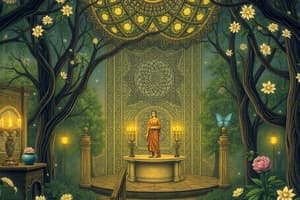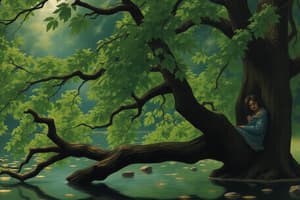Podcast
Questions and Answers
What is the primary aspect of nature and human experience associated with the concept of wildness?
What is the primary aspect of nature and human experience associated with the concept of wildness?
- Cultivated and domesticated
- Tamed and submissive
- Controlled and predictable
- Untamed and unpredictable (correct)
What is the emotional response often evoked by the beauty of wild things?
What is the emotional response often evoked by the beauty of wild things?
- Indifference and boredom
- Disgust and revulsion
- Awe, wonder, and fascination (correct)
- Fear and anxiety
What is the dual nature of the power of wildness?
What is the dual nature of the power of wildness?
- Neither destructive nor transformative
- Both destructive and chaotic, and transformative and liberating (correct)
- Only transformative and liberating
- Only destructive and chaotic
How do humans typically view wildness?
How do humans typically view wildness?
What do wild things often symbolize in human nature?
What do wild things often symbolize in human nature?
What is the role of wildness in human growth and creativity?
What is the role of wildness in human growth and creativity?
What is the relationship between wildness and human order and civilization?
What is the relationship between wildness and human order and civilization?
Flashcards are hidden until you start studying
Study Notes
The Concept of Wildness
- Refers to the untamed, uncontrolled, and unpredictable aspects of nature and human experience
- Associated with freedom, spontaneity, and the unconscious
The Beauty of Wild Things
- Refers to the allure and attraction of the untamed and unpredictable
- Can evoke feelings of awe, wonder, and fascination
- Often associated with the sublime, the mysterious, and the unknown
The Power of Wildness
- Can be destructive and chaotic, causing harm and disruption
- Can also be transformative and liberating, offering new possibilities and perspectives
- Can be a source of creativity, inspiration, and innovation
The Human Relationship with Wildness
- Humans have an ambivalent relationship with wildness, often seeking to control and dominate it
- Wildness can be seen as a threat to human order and civilization
- However, wildness is also necessary for human growth, creativity, and transformation
The Symbolism of Wild Things
- Often symbolize the unconscious, the irrational, and the primal
- Can represent the repressed, the hidden, and the unknown aspects of human nature
- Can also symbolize freedom, spontaneity, and the unbridled forces of nature
The Concept of Wildness
- Refers to untamed, uncontrolled, and unpredictable aspects of nature and human experience
- Associated with freedom, spontaneity, and the unconscious
Characteristics of Wildness
- Unpredictable and uncontrolled
- Associated with freedom and spontaneity
- Linked to the unconscious aspect of human nature
The Beauty of Wild Things
- Refers to the allure and attraction of the untamed and unpredictable
- Evoke feelings of awe, wonder, and fascination
- Often associated with the sublime, the mysterious, and the unknown
The Power of Wildness
- Can be destructive and chaotic, causing harm and disruption
- Can also be transformative and liberating, offering new possibilities and perspectives
- Can be a source of creativity, inspiration, and innovation
Human Relationship with Wildness
- Humans have an ambivalent relationship with wildness, seeking to control and dominate it
- Wildness can be seen as a threat to human order and civilization
- However, wildness is necessary for human growth, creativity, and transformation
Symbolism of Wild Things
- Often symbolize the unconscious, the irrational, and the primal
- Represent the repressed, hidden, and unknown aspects of human nature
- Can also symbolize freedom, spontaneity, and unbridled forces of nature
Studying That Suits You
Use AI to generate personalized quizzes and flashcards to suit your learning preferences.




